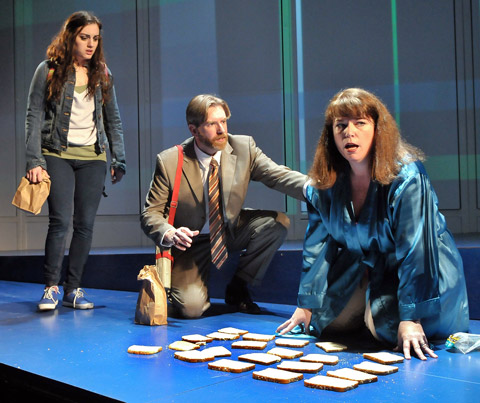
COPING MECHANISMS This musical about clinical depression lives up to its Tonys and Pulitzer Prize. |
Well, why not. After musicals about lynchings, ship sinkings, and presidential assassinations, it shouldn't be surprising that one of the hot musicals of the day, Next to Normal, concerns itself with bipolar disorder and electroconvulsive therapy. And any doubts about the show's artistic merits evaporate instantaneously in Speakeasy Stage Company's production (at the BCA through April 15) as the mother of the house, Diana, sings "Just Another Day" — about her love of family — before it turns out that all four members of that family are flirting with psychological disaster.Did I say four? Diana makes a gazillion sandwiches for lunch — on the kitchen floor — before she's whisked off to pharmaceutical therapy, which isn't meant to cure her, just to help her cope. She seems to be doing a decent job of that until we learn that Gabe, her son, is a figment of Diana's imagination. She sees his onstage incarnation at 18, but he died when he was eight months old.
Shades of Who's Afraid of Virginia Woolf? with the nonexistent son and the mother's unwillingness to let go, though the musical is actually more Albee-esque before we learn he doesn't exist. Until then, Diana's flipout has greater universality — after all, depression doesn't need such a traumatic turn of events to flourish. As a friend of mine said recently, "Anyone who isn't at least a little blue these days just isn't paying attention."
At any rate, Brian Yorkey, who wrote the book and lyrics, and Tom Kitt, who scored the music, thought it more important to be specific, and when the results are as strong as they are here — with biting, snapping rhymes and an infectious mix of musical styles — it's all but impossible to say they should have gone in a different direction. They got not only three Tonys but the Pulitzer Prize for drama (though the Pulitzer board had to override the jury, which did not nominate it).
One of the nominees was In the Next Room (or the Vibrator Play), which SpeakEasy did last year. The company has done an increasingly superb job of getting the rights to many of the smartest, most adventurous New York productions and then mounting them beautifully. Honcho Paul Daigneault also continues to grow as a director, as witnessed by his clever use of the Roberts Theatre stage at the Boston Center for the Arts. Daigneault and the design team seamlessly shift the action from house to hospital to school — and wherever the story suggests.
In almost each case there's a sense of stifled lives, of people being alone even when they're with others. Not just Diana, but her husband, Dan, who's determined to sweep the bad stuff aside, and their daughter, Natalie, whose bitterness at her mother's perceived slights undermines her own intellectual and musical accomplishments.
There's nothing stifled, however, about the singing chops of the ensemble, particularly Kerry Dowling as Diana and Christopher Chew as Dan. Chew so thoroughly inhabits his role, you want to give him a hug and a pat on the back. It isn't easy to sing about insecurity with bravado, but he does. Dowling, too, makes you feel both the manic and depressive sides of the disease. (The sound mix and instrumental playing are also first-rate.)
Kitt gives the singers plenty to work with, including a parody of "My Favorite Things." I can't say that I have much desire to hear the music outside of the theater, so I wouldn't call it a great score. So call Next to Normal next to great.